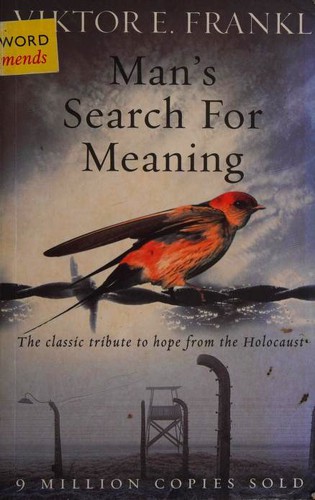Lavinia reviewed Man's Search for Meaning by Viktor E. Frankl
Finding Life's Meaning
5 stars
In the darkest corners of human existence, where hope seems a distant memory, Viktor E. Frankl's "Man's Search for Meaning" emerges as a profound testament to the indomitable human spirit. This is a story of tragedy and triumph, illustrating the power of hope and resilience.
The Holocaust, one of the greatest tragedies in human history, casts a long shadow over Viktor E. Frankl's narrative. Deported to concentration camps, Frankl confronts the depths of human suffering and loss. Yet, amidst the ruins of humanity, he uncovers a remarkable truth: the unbreakable human spirit. His story, interwoven with the silent struggles of his fellow inmates, serves as a universal symbol of resistance against despair and dehumanization.
Central to the book is the quest for life’s meaning. Frankl's experiences in the concentration camps profoundly influenced his existential outlook and his perspective on life, emphasizing the significance of finding meaning even in the most …
In the darkest corners of human existence, where hope seems a distant memory, Viktor E. Frankl's "Man's Search for Meaning" emerges as a profound testament to the indomitable human spirit. This is a story of tragedy and triumph, illustrating the power of hope and resilience.
The Holocaust, one of the greatest tragedies in human history, casts a long shadow over Viktor E. Frankl's narrative. Deported to concentration camps, Frankl confronts the depths of human suffering and loss. Yet, amidst the ruins of humanity, he uncovers a remarkable truth: the unbreakable human spirit. His story, interwoven with the silent struggles of his fellow inmates, serves as a universal symbol of resistance against despair and dehumanization.
Central to the book is the quest for life’s meaning. Frankl's experiences in the concentration camps profoundly influenced his existential outlook and his perspective on life, emphasizing the significance of finding meaning even in the most extreme conditions, maintaining a positive attitude, and the resilience of the human spirit in the face of adversity.
His personal suffering and the loss of his loved ones during this period reinforced his belief in the necessity of finding purpose. He proposes that suffering, love, and work are key paths to discovering life's meaning. Suffering, he argues, is not devoid of meaning but a potential source of it. Life, Frankl argues, holds a purpose in all circumstances, and our primary drive is to uncover this meaning.
This is a profound and philosophical question. The topic of life and death has been explored in depth in philosophy, religion, and literature throughout history. Like Victor E. Frankl, some philosophers argue that the awareness of mortality can give life meaning and urgency, leading to a fuller and more complete life. Martin Heidegger claimed that ‘being-towards-death’ grounds the temporality of Dasein (the experience of human beings), which is foundational for the meaning we give our lives.
On the other side, some, like Susanna Siegel, argue that life could be complete without death if one lives fully and realizes their potential. I’m leaning towards the latter, mostly because I am influenced by Epicurus, the ancient Greek philosopher, who argued that a correct understanding of death, may eliminate the fear of death, which is essential to having a happy life. Ultimately, I believe that the completeness of human life may be more about how one lives rather than the inevitability of death.
Frankl’s observations of human behaviour in the camps, where he witnessed acts of kindness and selflessness amid extreme suffering, also shaped his belief in the importance of individual choice and attitude, leading to his famous insight that "we always retain the ability to choose our attitude." He wrote:
"We who lived in concentration camps can remember the men who walked through the huts, comforting others and giving away their last piece of bread. They may have been few in number, but they offer sufficient proof that everything can be taken from a man, but one thing: the last of the human freedoms—to choose one’s attitude in any given set of circumstances, to choose one’s own way."
In the context of the Holocaust, freedom too takes on a new dimension. It is not a static state but a dynamic process. Despite the constraints of their circumstances, individuals possess the power to interpret, respond to, and even transform their situations. This form of freedom is not about escaping conditions but about how we engage with them. It is a call to embrace our capacity to shape our destiny, even amidst various constraints.
The latter part of the book introduces logotherapy, Frankl's psychological approach that emphasizes the pursuit of meaning. Logotherapy (logos is a Greek word that denotes meaning) is based on the premise that the primary human drive is not pleasure, as Freud suggested, nor power, as Adler argued, but rather the pursuit of what we find meaningful. This theory has contributed significantly to existential and humanistic psychology, emphasizing the individual's search for meaning as a key to mental health.
Viktor E. Frankl's book can have a profound impact on the reader. It’s not just a narrative of survival. It is an invitation to choose to find a purpose or meaning in any situation, including the worst conditions. In the darkest of places, he reminds us that we can still find light and meaning, ultimately shaping our own destiny.


